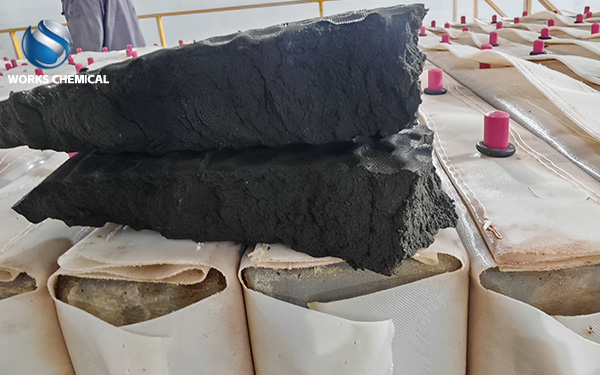
Municipal sludge is a solid waste produced in the process of urban sewage treatment. It has a complex composition and contains a large amount of organic matter, microorganisms, heavy metals, pathogenic microorganisms and various suspended particles, etc. Its moisture content is usually over 90%, it is viscous and difficult to handle. If not handled properly, it will cause serious pollution to the environment. Sludge enhancers have demonstrated significant advantages in municipal sludge treatment and have become an important means to enhance the efficiency of municipal sludge treatment.

Municipal sludge contains a large number of colloidal particles. These colloidal particles carry charges on their surfaces and repel each other, making it difficult for the sludge to settle and dewater. The flocculation components in the sludge enhancer can neutralize the charge on the surface of colloidal particles, disrupt the stability of the colloids, and promote the aggregation of colloidal particles to form larger flocs. These flocs have a loose structure, which is conducive to the separation of water and greatly increases the settling speed and dewatering efficiency of municipal sludge. After treatment, the moisture content of municipal sludge can be significantly reduced, usually from over 90% to 60%-70%, and the volume of sludge is greatly reduced. This not only lowers transportation costs but also creates favorable conditions for subsequent landfill, incineration or resource utilization.
A large number of pathogenic microorganisms and harmful substances existing in municipal sludge pose a potential threat to the environment and human health. Some components in the sludge enhancer have certain bactericidal and disinfection effects, which can effectively kill pathogenic microorganisms in municipal sludge and reduce its biological toxicity. Meanwhile, the sludge enhancer can also undergo chemical reactions with harmful substances such as heavy metals in the sludge, forming stable complexes or precipitates, reducing the mobility and bioavailability of heavy metals, and lowering the risk of their pollution to soil and groundwater.
In the process of municipal sludge treatment, traditional treatment methods often consume a large amount of energy and chemicals, resulting in relatively high treatment costs. The use of sludge enhancers can optimize the treatment process, reduce the dosage of other chemicals, and lower energy consumption during the treatment process. For instance, in the sludge dewatering process, adding an appropriate amount of sludge enhancer can enhance the working efficiency of the filter press, shorten the dewatering time and reduce the operating cost of the equipment. In addition, the properties of the treated municipal sludge are more stable, making it easier to carry out resource utilization. After further processing, it can be used as fertilizer for landscaping and soil improvement, or as fuel for incineration to generate electricity, etc., achieving the reduction, harmlessness and resource utilization of municipal sludge, which meets the requirements of sustainable development.
Sludge enhancers can effectively improve the sedimentation and dewatering performance of sludge in municipal sludge treatment, reduce the harm of harmful substances, lower treatment costs, and promote the resource utilization of municipal sludge. They have broad application prospects in the field of municipal sludge treatment.